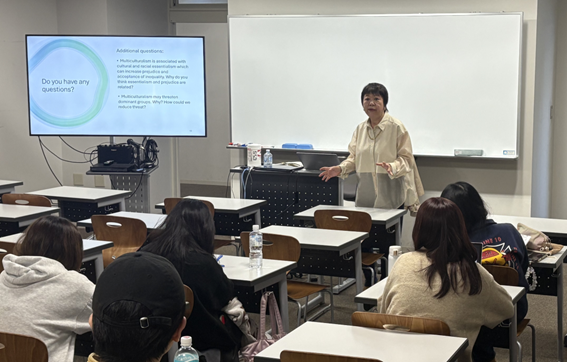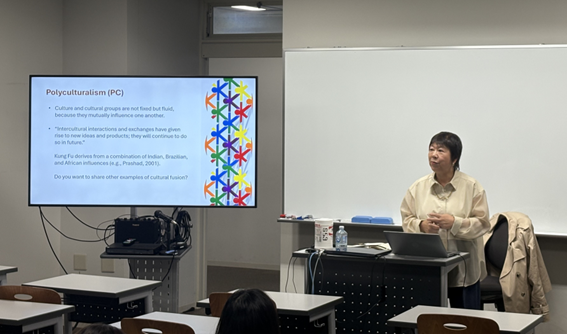深めて!南山GLS イベントレポート・コラム 講演会レポート
講演会実施報告 2025年10月28日(火)「Approaches to Intercultural Understanding in a Globalizing World」
2025.11.04
▼講演会
主催:国際教養学科
日時:2025年10月28日(火) 11:05~12:45
(Special Topics: Global Studies D (Communication Studies)授業内)
場所:Q104
内容:Approaches to Intercultural Understanding in a Globalizing World: How Lay Theories of Culture Influence Intercultural Behaviours
講師:Dr. Emiko Kashima (オーストラリア ラトローブ大学名誉教授)
参加者:26名
As part of the course "Special Topics in Global Studies (Communication Studies)," we were lucky to have a world-class professor, Dr. Emiko Kashima, Emeritus Professor at La Trobe University, Australia.
With the title of her lecture, "Approaches to Intercultural Understanding in a Globalizing World: How Lay Theories of Culture Influence Intercultural Behaviours," she explained basic concepts of culture and the historical evolution of cultural differences, showing how cultures vary across countries in modern society. Because of these differences, she emphasized the importance of managing intergroup ideologies such as assimilation, colorblindness, multiculturalism, and polyculturalism in each society.
We discussed in small groups which diversity ideology best describes Japanese society, comparing it with other countries such as the United States and Australia. Her lecture perfectly strengthened our understanding of key concepts of society, culture, and communication, and further broadened our perspectives on how our society can move forward and build better relationships with people from different cultural backgrounds.

From Students' Reflections:
A.
Today's lecture gave me the opportunity to think deeply about what culture and identity are. I wasn't familiar with the concept of polyculturalism, but as the professor mentioned, young people living in big cities tend to endorse polyculturalism, and I found myself agreeing with that perspective. It was interesting to learn about this new value and way of thinking.
Regarding the last discussion question, "Which diversity ideology is the most popular in Japan?", our group concluded that it was "multiculturalism."
This doesn't mean all members in our group had the same reason. Some of us, including me, thought that Japan shows signs of multiculturalism, but it depends on the generation. Young people tend to have more opportunities to interact with foreigners, while older generations tend not to actively accept foreign people. However, overall, I think Japan is becoming increasingly multicultural with the changing times.
B.
Before this class, I used to think of culture as something that belonged to a specific group of people--something stable, traditional, and almost unchangeable. However, through our discussions on polycultural identity, my understanding of culture has changed completely.
I realized that culture is not something fixed, but something that is constantly being shared, adapted, and reshaped through interaction.
The idea of cultural appropriation also made me think deeply. I sometimes see people online criticized for "borrowing" parts of another culture, such as clothing or language. I used to think it was always negative, but now I see that the intention and understanding behind the action matter. When people borrow cultural elements with respect and awareness, it can become a form of connection rather than exploitation.
Personally, I feel that my own identity is becoming more polycultural as I interact with different people, study global topics, and consume international media. I find myself naturally combining ideas from various cultures in my daily life, whether in how I think, speak, or even what I eat. This realization makes me proud, because it shows that identity is not about choosing one culture over another, but about finding balance between them.
C.
Through my experience living in Australia, I thought it would be very difficult for Japan to become a polycultural country. Japan has had its own long history and a unique culture since ancient times, especially compared to Australia.
In addition, as an island nation, it has been difficult for other cultures to blend in. The older generation, in particular, tends to have a strong sense of Japanese identity.
Even though the younger generation today is more open and accepting of new cultures, I believe that it is still quite difficult to truly integrate them into Japanese culture.
I want Japan to be a country that acknowledges and respects all cultures. However, I realized that for Japan to become more multicultural, each individual needs to think deeply about culture and their own identity. Through this class, I learned the importance of perspective-taking and want to make it a greater priority in my life.
D.
In this class, I learned about colorblindness and polyculturalism for the first time. Before this, I believed that multiculturalism was the best and only way to understand and respect different cultures. I thought that recognizing and protecting each culture was the most fair and inclusive approach.
However, learning about these new ideas made me think more deeply. Colorblindness was surprising to me. It suggests that we should not focus on cultural or racial differences. At first, this sounded fair, but I realized it can ignore the real problems that some groups face.
Polyculturalism was especially interesting. It shows that cultures are not fixed or separate; instead, they mix and influence each other all the time. This idea helped me understand that culture is always changing. It also made me think that we don't need to protect cultures by keeping them separate. Polyculturalism can help people be more open-minded and flexible. It teaches us to see culture as something we share and shape together.


